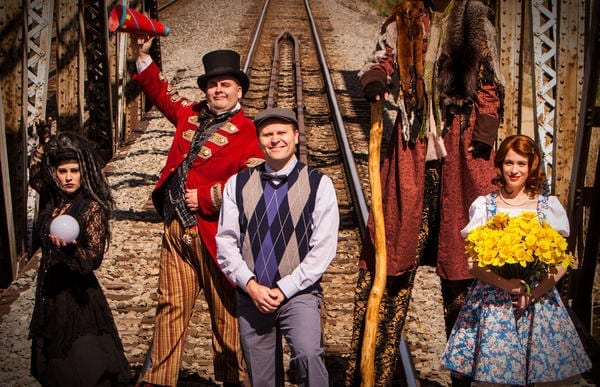Orem—As told by Will Bloom (Jacob Theo Squire), “A man tells his stories so many times that he becomes the stories. They live on after him, and in that way he becomes immortal.” This line encompasses the heart and theme of Hale Center Theater Orem’s state premiere of Big Fish. With its strong focus on families, this musical adaptation by John August and Andrew Lippa of the popular motion picture is the perfect show for Hale’s audience. It follows the story of Edward Bloom (Ben Henderson) in his final years and his reconciliation with his son Will. Edward has a flair for embellishing the stories of his life, much to the distain of his son. Will sets out on a quest to determine just which stories are true and which aren’t and in so doing gains a greater respect for the good his father has done. What starts out as a mission to disprove his father’s “tall tales” or “fairytales” morphs into a greater level of love and respect that brings the two closer together in an emotional touching finish to both the play and Edward’s life.

Director Chris Clark does a superb job of creating a visually stunning production in the intimate theater with the spectacle of the various fairytale characters, while balancing the themes and weight of the story in an exquisite manner. His direction was strongly supported by an excellent production team. Jennifer Hill-Barlow’s excellent choreography heightened the group scenes with impressive carnival acrobats that aided the fairytale aspects of the storytelling and heightened the energy of many numbers such as “Ashton’s Favorite Son” and “Be the Hero.” Music Director Justin Bills did a fantastic job of bringing out rich harmonies in the ensemble numbers with clear diction and appropriate stylizing.
The scenic design by Bobby Swenson, with the aid of Cody Hale’s projection design and Penny Jones’s scenic painting expertly utilized the small stage to create a visually stunning production. The ending of Act I in the number “Daffodils” was especially impressive. MaryAnn Hill’s colorful costume design accentuated the magical world of the play and aided the creation of the many characters. I especially appreciated the attention to detail in distinguishing between the fairytale world and the realistic world through her design and color pallet.
Jacob Theo Squires made an outstanding Will and was the highlight of the show. His powerful voice soared in such numbers as “Stranger” and “How it Ends”. His vocal talent was matched equally by great acting choices and he brought a commanding and charismatic energy to the stage that was appropriate for the character. Ben Henderson carried the show with ease in creating an entertaining and likable Edward. Henderson was believable in creating a character much older than himself with nuanced mannerisms and maturity in his physicality that was convincing and endearing. Though his singing was not as strong as his acting, particularly in the higher ranges where there were a few vocal lapses, on the whole he delivered a fine performance. He was also successful in his scenes with Young Will (Dash Barlow) and they made a believable father and son. Their duet “Fight the Dragons” was a standout number of the show.

Amanda Crabb made a lovely Sandra Bloom. She aged appropriately throughout the story and was most successful in the latter scenes as Will’s mother. Her strong voice really filled the theater in such numbers as “Red, White & True” and “I Don’t Need a Roof.” Other notable performances included MacKenzie Seiler as The Witch, Daniel Fenton Anderson as Amos Calloway and Cleveland McKay Nicoll as Karl who each brought humor to the show in their respective roles.
I was less pleased with Riley Branning as Josephine and Sariah Hopkin as Jenny Hill. Both of these performances felt flat and lacked the depth needed in comparison to the other lead actors. This was in part due to the underdeveloped writing of their roles, but I wanted more from them both in their various scenes. Particularly Branning’s relationship with her husband was lacking and Josephine bordered on caricature rather than bringing the weight and depth needed in her scene when she meets Will in Act II.
I also found much of Lippa’s score to be uninteresting, with few memorable numbers and many more forgettable melodies. Despite these few shortcomings, Hale delivers an exceptional production of this much-loved story. I would strongly encourage audiences young and old to attend this production, as it is appealing to a wide range of viewers.
[box type=”shadow”]BIG FISH plays at the Hale Center Theater, 25 West 400 North, Orem, Mondays through Saturdays at 7:30pm, matinees on saturday at 3pm, through June 20. Tickets are $16-$22 and can be purchased at haletheater.org[/box]
